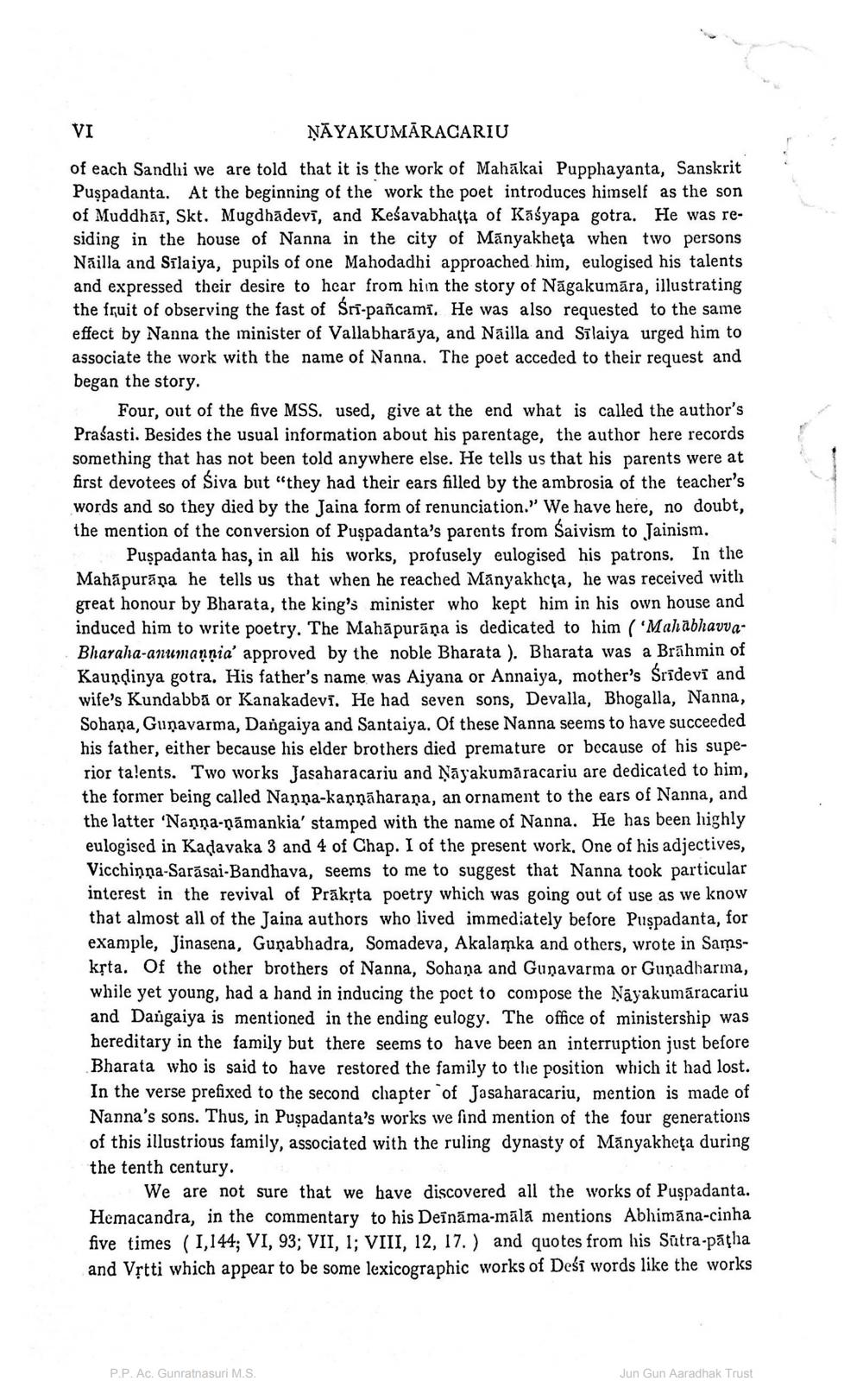________________ VI NA YAKUMARACARIU of each Sandhi we are told that it is the work of Mahakai Pupphayanta, Sanskrit Puspadanta. At the beginning of the work the poet introduces himself as the son of Muddhai, Skt. Mugdhadevi, and Kesavabhatta of Kasyapa gotra. He was residing in the house of Nanna in the city of Manyakheta when two persons Nailla and Silaiya, pupils of one Mahodadhi approached him, eulogised his talents and expressed their desire to hear from hin the story of Nagakumara, illustrating the fruit of observing the fast of Sri-pancami. He was also requested to the same effect by Nanna the minister of Vallabharaya, and Nailla and Silaiya urged him to associate the work with the name of Nanna. The poet acceded to their request and began the story. Four, out of the five MSS. used, give at the end what is called the author's Prasasti. Besides the usual information about his parentage, the author here records something that has not been told anywhere else. He tells us that his parents were at first devotees of Siva but "they had their ears filled by the ambrosia of the teacher's words and so they died by the Jaina form of renunciation." We have here, no doubt, the mention of the conversion of Puspadanta's parents from Saivism to Jainism. Puspadanta has, in all his works, profusely eulogised his patrons. In the Mahapurana he tells us that when he reached Manyakhcta, he was received with great honour by Bharata, the king's minister who kept him in his own house and induced him to write poetry. The Mahapurana is dedicated to him ( MahabhavvaBharaha-anumannia' approved by the noble Bharata ). Bharata was a Brahmin of Kaundinya gotra. His father's name was Aiyana or Annaiya, mother's Sridevi and wife's Kundabba or Kanakadevi. He had seven sons, Devalla, Bhogalla, Nanna, Sohana, Gunavarma, Dangaiya and Santaiya. Of these Nanna seems to have succeeded his father, either because his elder brothers died premature or because of his superior talents. Two works Jasaharacariu and Nayakumaracariu are dedicated to him, the former being called Nanna-kannaharana, an ornament to the ears of Nanna, and the latter 'Nanna-namankia' stamped with the name of Nanna. He has been highly eulogised in Kadavaka 3 and 4 of Chap. I of the present work, One of his adjectives, Vicchinna-Sarasai-Bandhava, seems to me to suggest that Nanna took particular interest in the revival of Prakrta poetry which was going out of use as we know that almost all of the Jaina authors who lived immediately before Puspadanta, for example, Jinasena, Gunabhadra, Somadeva, Akalamka and others, wrote in Samsksta. Of the other brothers of Nanna, Sohana and Gunavarma or Gunadharma, while yet young, had a hand in inducing the poct to compose the Nayakumaracariu and Daugaiya is mentioned in the ending eulogy. The office of ministership was hereditary in the family but there seems to have been an interruption just before Bharata who is said to have restored the family to the position which it had lost. In the verse prefixed to the second chapter of Jasaharacariu, mention is made of Nanna's sons. Thus, in Puspadanta's works we find mention of the four generations of this illustrious family, associated with the ruling dynasty of Manyakheta during the tenth century. We are not sure that we have discovered all the works of Puspadanta. Hemacandra, in the commentary to his Deinama-mala mentions Abhimana-cinha five times (1,144; VI, 93; VII, 1; VIII, 12, 17.) and quotes from his Sutra-patha and Vstti which appear to be some lexicographic works of Desi words like the works P.P. Ac. Gunratnasuri M.S. Jun Gun Aaradhak Trust




